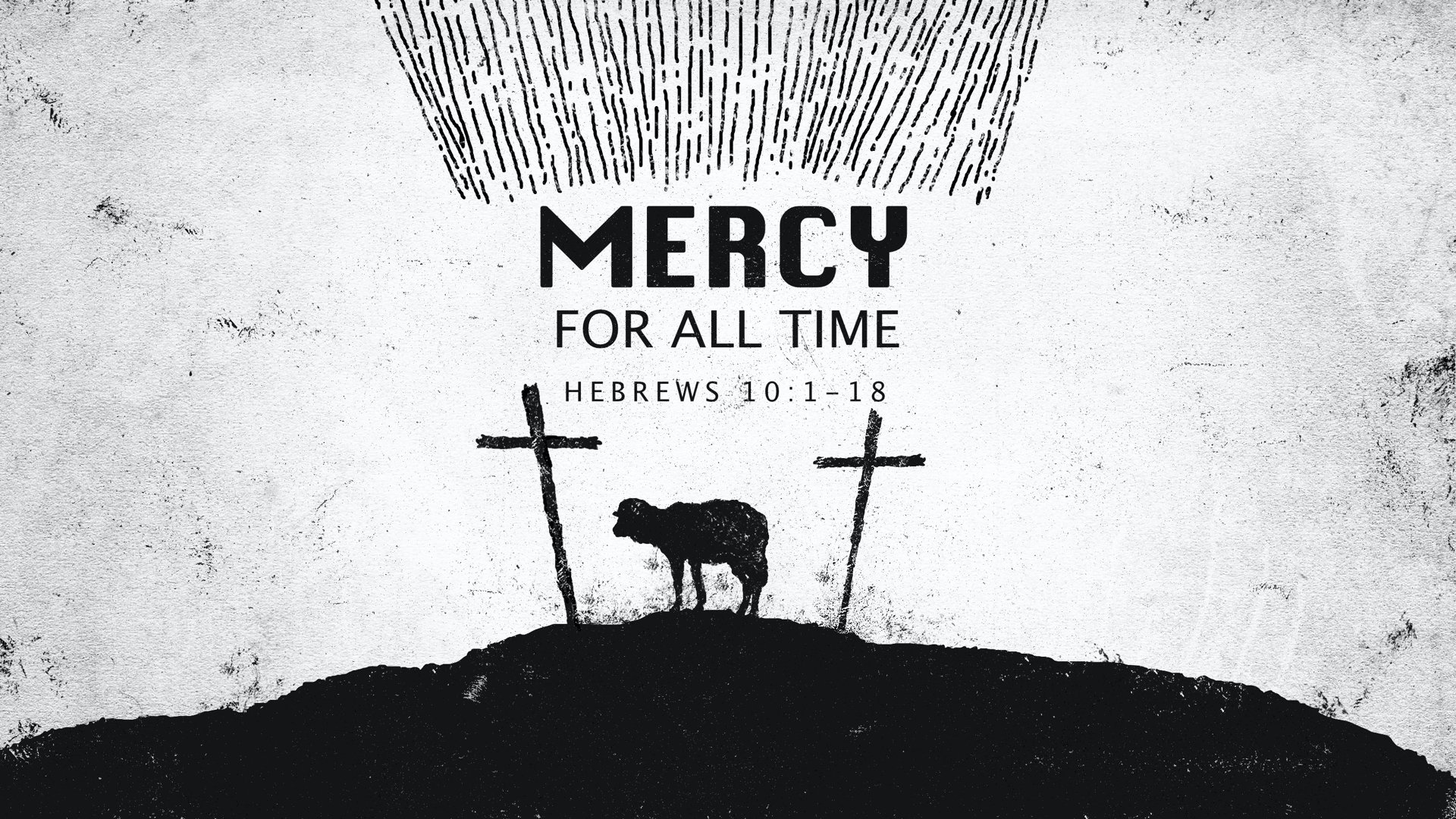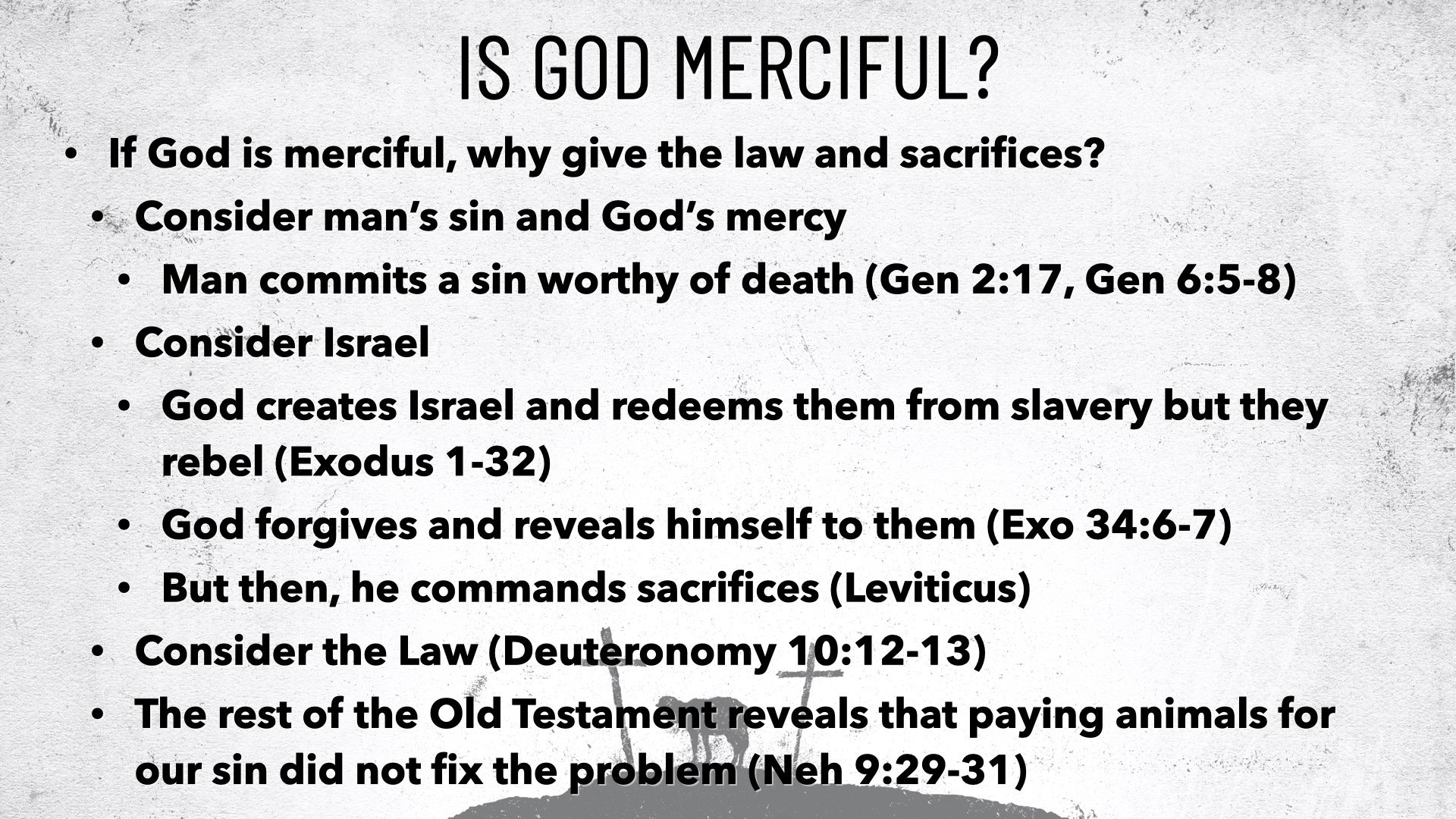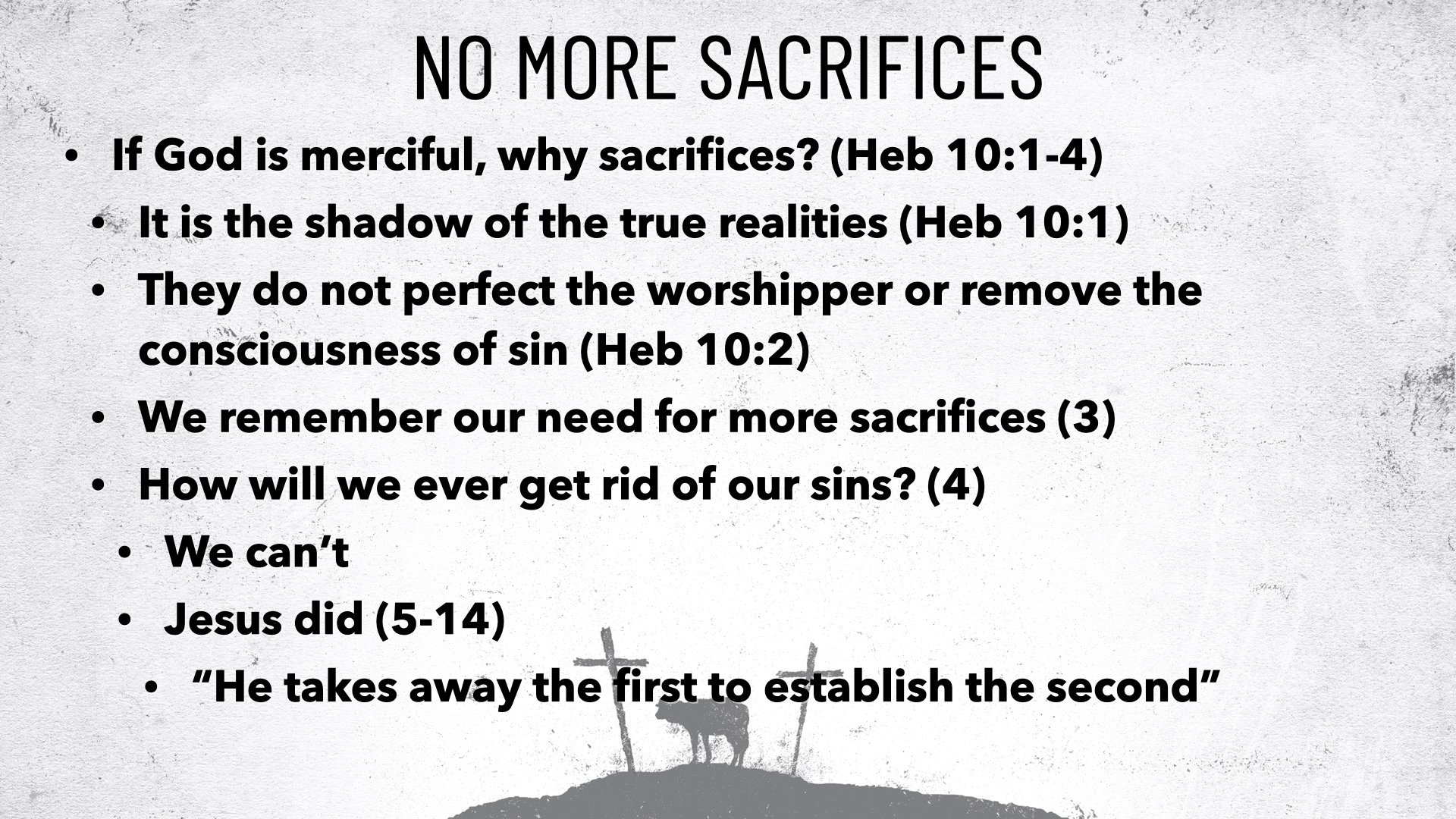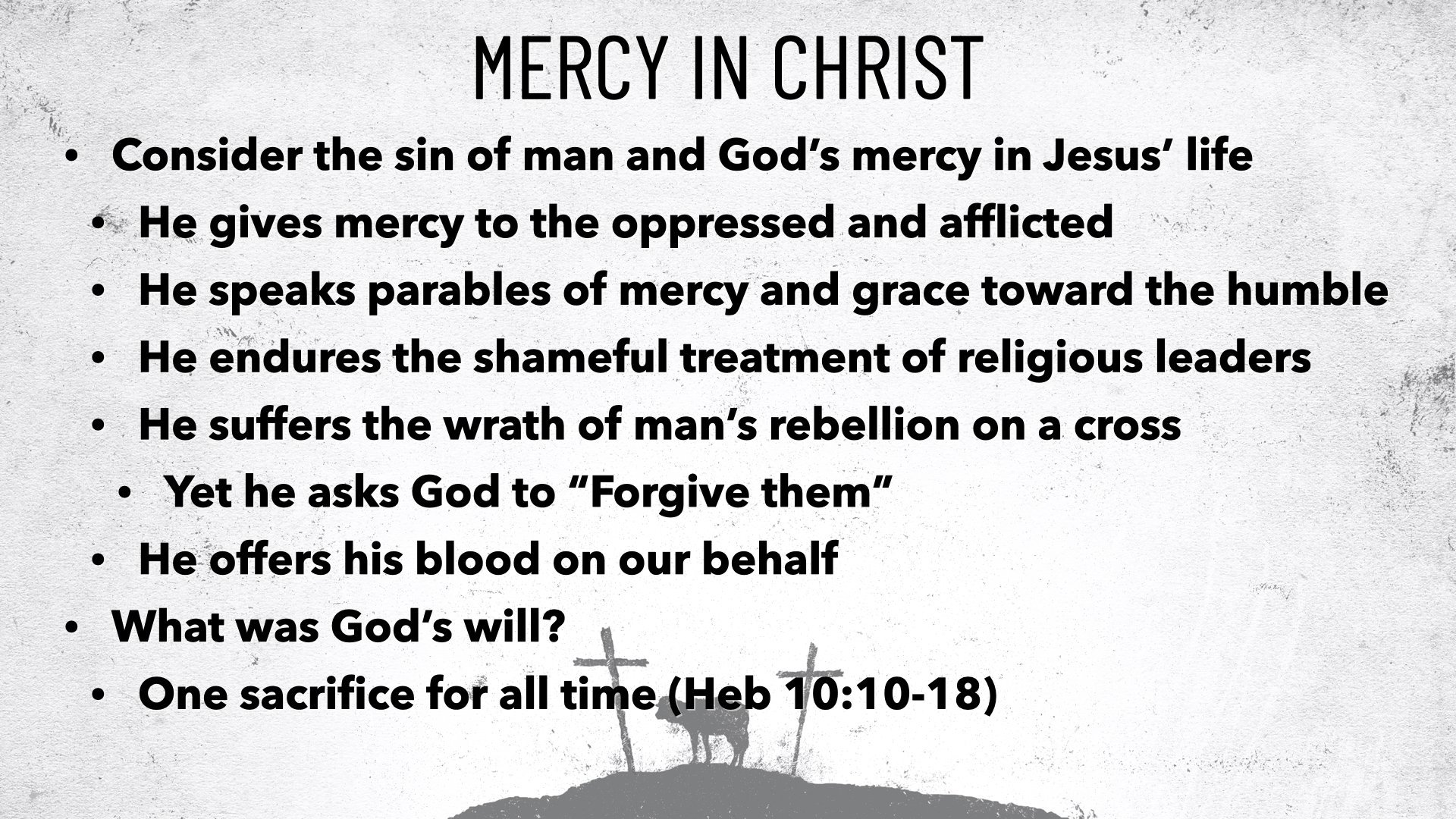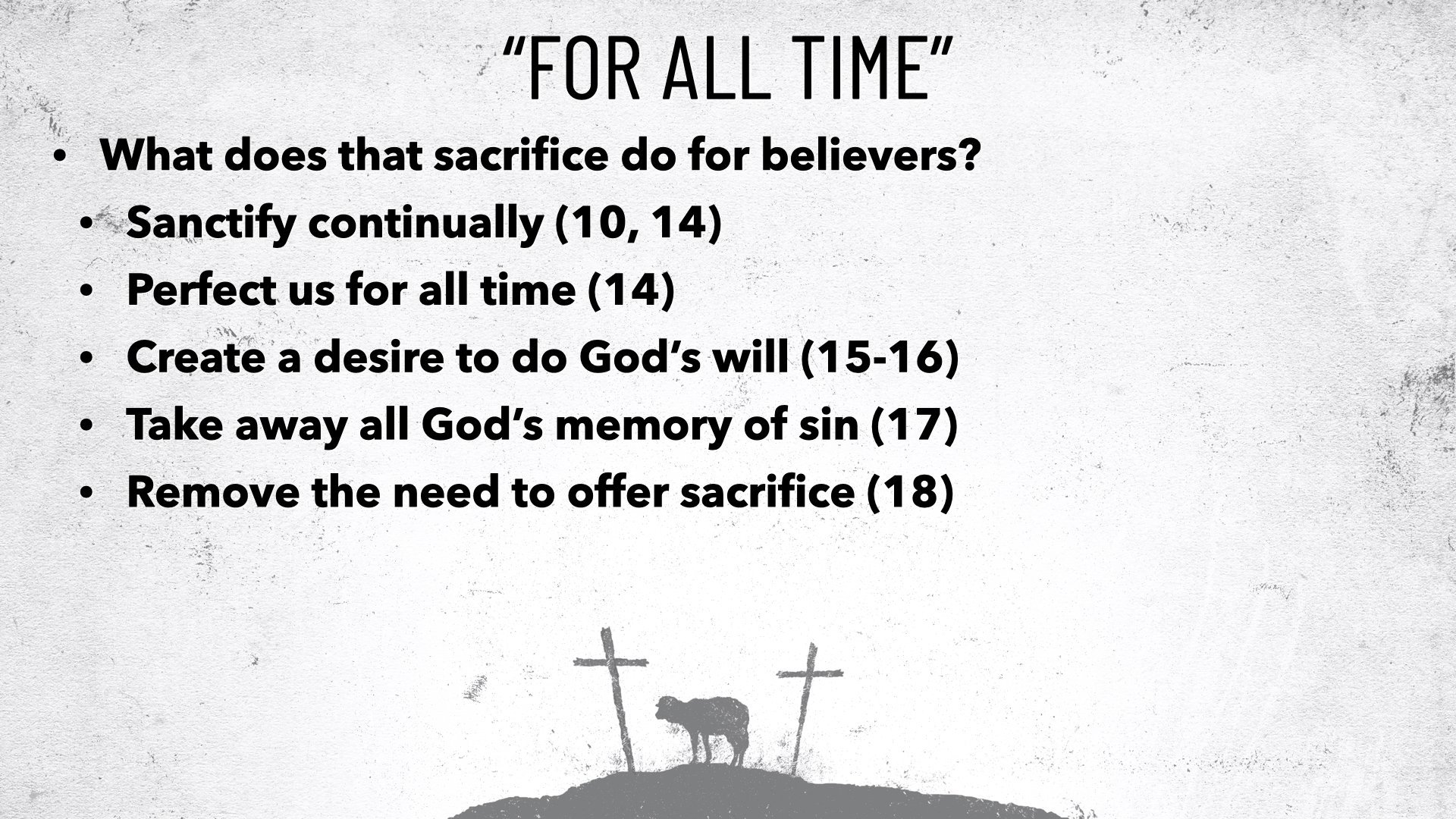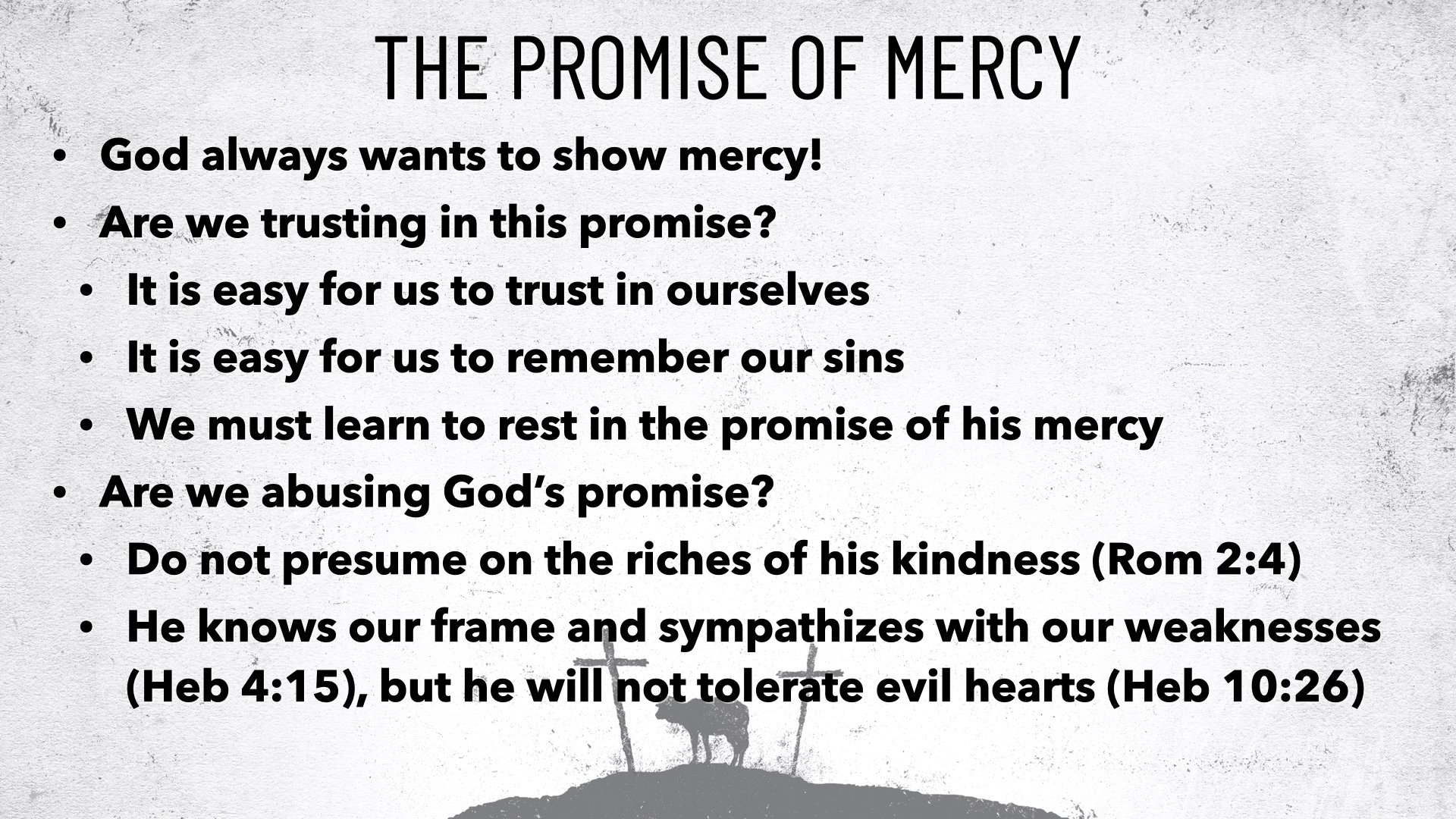Mercy For All Time (Hebrews 10:1-18)
Is God cruel or kind? This is a question that many want to know. Many people look at their situation when suffering and think, "God is cruel." Or they look at their wealth and prosperity and think, "God is kind." But does our situation determine whether God is cruel or kind? Is God's character really based on the events that take place in our life? This year, we are going to be looking at the kindness and generosity of God. After a year like 2020, we must stay focused and aware of God's promises. God has promised good things to those who love him, and the Bible tells us that he who promised is faithful. (Hebrews 10:23) I might tell my kids we are going to do something without considering certain obstacles. I might have to go back on my word and fail to fulfill my promises. God never fails. So we need faith to look past our current circumstances and hold on to the hope we have in a God full of love. A God who makes promises and always fulfills them.
Today, we are going to look at the promise of mercy. God has shown mercy to mankind throughout the Bible, and he promises mercy to all who come to him, seeking it with the right heart. To begin, we will be focused on one main text (Hebrews 10:1-18)
This morning, our goal is to more fully understand all that is implied in this text because, to me, this contains one of the most wonderful promises of mercy found in the Bible.
Is God Merciful?
What if I said, "Yes! He is so merciful he lets us offer sacrifices to atone for our sins." Does that sound merciful? It sounds pretty merciful when we consider that the wages of sin is death (Rom 6:23). I would certainly want to offer a sacrifice to keep from dying. That's what all of the Israelites in the Old Testament we're told to do.
Consider The Beginning
To better understand this, let's see where sacrifices came from. Consider man's sin and God's mercy. From the very beginning, we notice man sinning and God showing mercy. Adam and Eve were supposed to die for eating the "Tree of knowledge of good and evil." But they didn't physically die that day. They lost innocence, became worthy of death, died spiritually, were separated from God, and needed forgiveness for rebelling against God's command. But they did not die. Is that mercy or injustice? We are left to wonder.
Eventually, man became so self-seeking and destructive that God destroyed all but eight. That doesn't sound very merciful. It sounds just but not merciful. From God's perspective, it was merciful. The decision to kill over a billion people in a flood was not something God did lightly or enjoyed doing. In Ezekiel, we read that he would rather the wicked turn from their wickedness and live (Ezek 18, 33). He can't let the wicked go unpunished forever. That would be unjust and unmerciful. How strong of a message is that for us today? Doesn't mankind need to see that God will judge those who persist in evil and refuse to change? If God didn't judge them, we would still live in a society like Noah's. Children are going to walk all over the parent that doesn't punish them. They will ruin their lives and make life miserable for everyone. So God was merciful in allowing man to live initially, and he was merciful in killing almost all of man in the flood.
Consider Israel
Next, let's consider Israel. From Genesis 12 onward, the whole story changes as God interacts with mankind. In Genesis and Exodus, we see God working providentially and miraculously to save Israel from famine and slavery in Egypt. These mighty works should encourage all men to seek God. Men can come into Israel and have a relationship with God as God's chosen people. Did men stop sinning and run to God with open arms? No. Even Israel rebelled against God repeatedly.
In Exodus 34, God reveals his character so that men would trust in him.
Exodus 34:6--7 (ESV) --- 6 The Lord passed before him and proclaimed, "The Lord, the Lord, a God merciful and gracious, slow to anger, and abounding in steadfast love and faithfulness, 7 keeping steadfast love for thousands, forgiving iniquity and transgression and sin, but who will by no means clear the guilty, visiting the iniquity of the fathers on the children and the children's children, to the third and the fourth generation."
Notice the first description of God. He is merciful. The following descriptions all point to this same fact; God is merciful. What about the phrase at the end? It says, "He will by no means clear the guilty." Doesn't that sound unmerciful? Not really. Even his judgment against the wicked is merciful. We need to know that there will be consequences. Would we want to live in a world where God clears those who refuse to turn from their sin? The reality of a spanking helps my children, at a young age, make the right decisions that will help them live a good life. God, like a parent, wants what's best for Israel. God does not clear the guilty. He will destroy the rebellious. But he doesn't immediately destroy them. He lets them live and gives them a chance to change.
Giving The Law and Prophets
This is also when God gives his law and ordinances for sacrificing to him like we are studying in Hebrews 10:11.
Deuteronomy 10:12--13 (ESV) --- 12 "And now, Israel, what does the Lord your God require of you, but to fear the Lord your God, to walk in all his ways, to love him, to serve the Lord your God with all your heart and with all your soul, 13 and to keep the commandments and statutes of the Lord, which I am commanding you today for your good?
He gives them the law for their good. The law wasn't intended to be a huge burden that would be too much for them to carry. If they stopped sinning, they would hardly ever offer sacrifices. The law was intended to help them see their sin and stop sinning. Then they could draw close to God. It was also supposed to make their community better.
In Leviticus, he gives them a sacrificial system where God can forgive them of all unintentional sins. An animal would have to die to make atonement for their sins.
Throughout this initial time with Israel, God shows himself extremely merciful. He lets them get close to him, and when they rebel, he does not annihilate them. He tries to purge the evil from their midst before bringing them to the land of promise, but they all rebel and refuse to go in. Still, he does not eradicate them. He allows their children to go in. When we read Joshua, we see that God gives the land to them. In Judges, we see rebellion in the land. God doesn't eradicate them. He gives them Judges to save them over and over again. Then, he gives them Samuel, Saul, and David.
Throughout the kings' reign, God repeatedly gives prophets to reveal their sin and God's love for them. Why? God doesn't want to destroy the nation he has created. He would rather they turn from their sin and repent (Ezek 18). As God destroys Israel, he tells them everything he is going to do and why. Who does that? We see God doing that so that they will understand his justice. He must punish evil and sin. But he also tells them that he will bring them back to life if they turn from sin and submit to his will. The prophets tell us that one day God is going to do something so great that they will finally learn to seek God and stop rebelling against him.
Redeemed Again?
But first, their sin gets so bad that he has to carry them into Babylonian captivity. Nehemiah shows us how the people came back to Israel after the Babylonian captivity. They have gone through tremendous suffering, but listen to what they say about themselves and God.
Nehemiah 9:29--31 (ESV) --- 29 And you warned them in order to turn them back to your law. Yet they acted presumptuously and did not obey your commandments, but sinned against your rules, which if a person does them, he shall live by them, and they turned a stubborn shoulder and stiffened their neck and would not obey. 30 Many years you bore with them and warned them by your Spirit through your prophets. Yet they would not give ear. Therefore you gave them into the hand of the peoples of the lands. 31 Nevertheless, in your great mercies, you did not make an end of them or forsake them, for you are a gracious and merciful God.
Unfortunately, they did not keep this understanding for very long. About fifty years later, in the book of Malachi, God says, "I have loved you." Israel responds by saying, "How have you loved us?" Every time he disciplines or allows his people to suffer, they fail to see his mercy and grace. They need something else, and God promises to give them what they need.
No More Sacrifice
So why did God give them sacrifices?
Hebrews 10:1--4 (ESV) --- 1 For since the law has but a shadow of the good things to come instead of the true form of these realities, it can never, by the same sacrifices that are continually offered every year, make perfect those who draw near. 2 Otherwise, would they not have ceased to be offered, since the worshipers, having once been cleansed, would no longer have any consciousness of sins? 3 But in these sacrifices there is a reminder of sins every year. 4 For it is impossible for the blood of bulls and goats to take away sins.
This verse says that the daily work of sacrifice never takes away sin. Why were countless animals killed when their blood can't take away sins. If that didn't work, why were they doing it? First, we see that the sacrifices were intended to be a shadow of the true realities. They were of no effect at perfecting man or giving man freedom from sin because they had no substance. There was still a consciousness of sins as soon as the sacrifice was over. There was a constant dread of the next sacrifice that would have to be offered after the next sin (because there might be a sin later that day).
Notice in verse three that God wants us to be reminded of what he sees: That sin is rampant and never-ending worthiness of death. We can't be perfected by sacrifices that we offer for our sin because the blood of an animal can't be substituted for a human's blood. Plus, how many sacrifices would we have to do every day to keep up?
So how will we ever get rid of our sin? The point of this is to say that we can't get rid of our sin. Jesus came to do what we couldn't do.
Hebrews 10:5--9 (ESV) --- 5 Consequently, when Christ came into the world, he said, "Sacrifices and offerings you have not desired, but a body have you prepared for me; 6 in burnt offerings and sin offerings you have taken no pleasure. 7 Then I said, 'Behold, I have come to do your will, O God, as it is written of me in the scroll of the book.'" 8 When he said above, "You have neither desired nor taken pleasure in sacrifices and offerings and burnt offerings and sin offerings" (these are offered according to the law), 9 then he added, "Behold, I have come to do your will." He does away with the first in order to establish the second.
This section lays out the ultimate solution to our problem. It tells us that Jesus came to do the will of God, and it was God's will that he die for our sin. When he did the will of God, he took away the covenant based on our sacrifices and established a new covenant based on his sacrifice.
The Greatest Act of Mercy
All of God's mercy in the Bible builds up to the New Testament, where God sends Jesus to show the most incredible mercy the world has ever seen. Jesus' whole life was about mercy. He calls fishermen and tax collectors to do more miracles than anyone has ever done in the Old Testament. He heals every disease and affliction. He defeats Satan's evil, demonic forces. Jesus not only lives out the merciful character of God for all to see, but he also explains what God is seeking in a way we can understand.
The parables of the prodigal son, the lost sheep, the unmerciful servant, and many others point to God's mercy and his desire for our heart. Jesus portrays God as a loving Father who sent his son to shepherd the lost sheep of Israel, bringing them back into the fold. He proves that God is more merciful than man could even imagine.
The final act of Jesus' life was the ultimate outpouring of love and mercy from God. He let mankind perform their greatest act of sin. God let them murder his perfect son.
John 3:16--17 (ESV) --- 16 "For God so loved the world, that he gave his only Son, that whoever believes in him should not perish but have eternal life. 17 For God did not send his Son into the world to condemn the world, but in order that the world might be saved through him.
Jesus endured the wrath of mankind's rebellion for all to see. Many people believe that God was wrathful toward Jesus. They think that somehow, God "imputed" all mankind's sins (or transferred them) onto Jesus, and he punished Jesus for man's sin. I understand the passages they get that from, but I don't see it this way. God is not like the gods men make up, where we have to throw a human in a volcano. He can forgive. Forgive doesn't mean you vent your wrath on someone else. Forgive means you let it go. Jesus was perfect and blameless. He was completely sinless, and his blood was so valuable that it could purchase our redemption. Remember, God is not like man. He does not have to lash out and vent his anger. He seeks to forgive. Jesus' sacrifice is about God's mercy, not God's wrath. The blood of God pays the price to redeem mankind and repurchase them from their slavery to sin and death. That's mercy.
Drawing Us Nearer To Him
Now, let's reread the end of this passage.
Hebrews 10:10--18 (ESV) --- 10 And by that will we have been sanctified through the offering of the body of Jesus Christ once for all. 11 And every priest stands daily at his service, offering repeatedly the same sacrifices, which can never take away sins. 12 But when Christ had offered for all time a single sacrifice for sins, he sat down at the right hand of God, 13 waiting from that time until his enemies should be made a footstool for his feet. 14 For by a single offering he has perfected for all time those who are being sanctified. 15 And the Holy Spirit also bears witness to us; for after saying, 16 "This is the covenant that I will make with them after those days, declares the Lord: I will put my laws on their hearts, and write them on their minds," 17 then he adds, "I will remember their sins and their lawless deeds no more." 18 Where there is forgiveness of these, there is no longer any offering for sin.
Do you see the repetition? The writer says, "For all time." What does that mean? Does that mean present time? Yes. What about the past? Yes. What about Abraham's sins? Yes. What about the future? Yes. Jesus' blood perfects us for all time. The past, present, and future sins of every man to ever walk on the earth are covered under one offering.
Then he says, "He has perfected for all time those who are being sanctified." Are you perfected? If you are in Christ, you are. Are you sanctified? I'm a work in progress. In verse 16, he says, "I will put my laws on their hearts, and write them on their minds." Has God done that for you? He says that he will. The law is for our good, and he promises to write it on our hearts. What does that mean? It means he will make us want to obey. God's people will see God's word as sweet honey. They won't continue in sinful rebellion, abusing God's mercy. They will seek to grow into the image of Christ. They will want to know more about God and do his will.
In verse 17, he says, "I will remember their sins and their lawless deeds no more." We may want to dwell on our sins, but if we have the blood of Christ offered for our sins, God doesn't remember them. They are as far from us as the east is from the west.
I love Jeremiah's words in Lamentations 3:23, which says, "His mercies are new every morning."
Application & Conclusion
We dig deep into the word to make applications that are hard to hear. It hurts to see our sins. But this is why we do it. The message of this promise is the most significant promise of all to weak humanity. This motivates us to change and gives us hope of receiving all of the other promises God makes. Lord willing, we will continue to study the promises he made in the coming months.
I hope you can enjoy all of these promises for yourself. Have you received the sacrifice God offered on your behalf? If not, it's available for you today. God doesn't want to destroy anyone. Why would you make yourself his enemy when you could be his son or daughter and enjoy all the blessings he offers?

